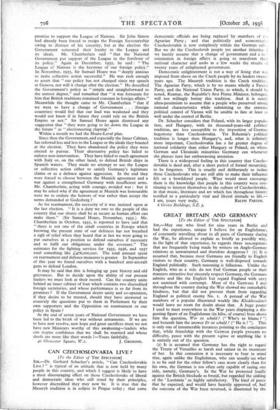CAN CZECHOSLOVAKIA LIVE ?
[To the Edith,. of THE SPECTATOR] SIR,—Dr. Gerhard Schacher's article, " Can Czechoslovakia Live ? " is typical of an attitude that is now held by many people in this country, and which I suggest is liltely to have a most discouraging effect on those Czechoslovaks of liberal and democratic ideas who still stand by their principles, however discredited they may now be. It is true that the Masaryk tradition is in eclipse in Prague today ; that some democratic officials are being replaced by members of t; Agrarian Party ; and that politically and economical: Czechoslovakia Czechoslotiakia is now completely within the German orb But we dO the Czethoslovak 'people yet another injustice we' hastily assume that a change of government and a new Orientation in foreign affairs is going to' transform their national character and undo in a "few weeki the results of twenty years of enlightened government.
' Democratic enlightenment is not a way of living that was imposed from above on the Czech people by its leaders twenty years ago. The Masaryk. tradition is the. Czech traditior.. The Agrarian Party, which is by no means wholly a Fascist Party, and the National Union Party, to which, it should be noted, Kramar, the Republic's first Prime Minister, belonged, will not willingly betray this tradition. And it is surely ultra-pessimism to assume that a people who preserved strong national characteristics while submitting to the extreme political control of Vienna will be unable to fare at least as well under the control of Berlin. - - Dr. Schacher considers that Poland, with its larger popula- tion, and Hungary, with•- its thousand-years-old political tradition, are less susceptible to the imposition of German hegemony than Czechoslovakia. Yet Bohemia's political tradition is longer than Hungary's, and, what is infinitely more important, Czechoslovakia has a far greater degree of national solidarity than either Hungary or Poland, on whose German and Uluainiin minorities Germany can whenever she pleases turn her embarrassing attention. .
There is a widespread feeling in this country that Czecho- sldvakia is dead and, after a short period of formal mourning, to be forgotten. This is cruelly and deliberately to isolate those Czechoslovaks who are still able to make their influence felt on a bewildered people. What would most encourage them is the knoWledge that people in this 'country were con- tinuing to interest themselves in the culture of Czechoslovakia, in that music, literature and art whiCh has throughciut history testified to a particularly vital and liberal attitude to life.—
























































 Previous page
Previous page